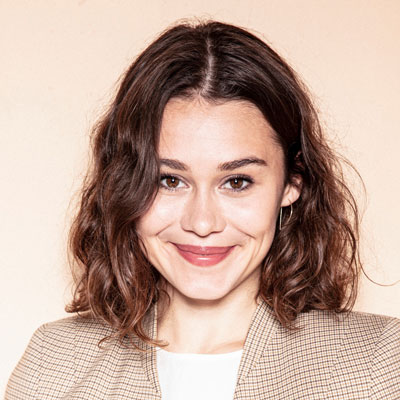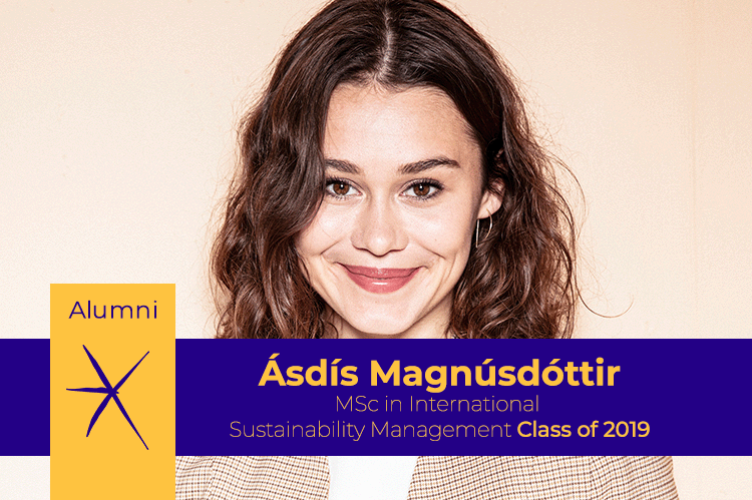MSc in International Sustainability Management (SustM)
Meet the Alumni: Ásdís Magnúsdóttir, Class of 2019
 After graduating from ESCP, Ásdís Magnúsdóttir worked as a programme analyst for UNDP in Zimbabwe in the department of Poverty Reduction, Environment and Climate Change. She describes her experiences and shares some of the things she learned in the MSc in International Sustainability Management (SustM). She now works at Carbfix as a Project Manager in public funding and policy,
After graduating from ESCP, Ásdís Magnúsdóttir worked as a programme analyst for UNDP in Zimbabwe in the department of Poverty Reduction, Environment and Climate Change. She describes her experiences and shares some of the things she learned in the MSc in International Sustainability Management (SustM). She now works at Carbfix as a Project Manager in public funding and policy,
Tell us a bit about yourself. What were you doing or studying before you started the SustM?
I am Icelandic but grew up both in Reykjavík, Iceland and in Durham, North Carolina (USA). I studied philosophy at the University of Iceland in 2013-2017 and studied on an Erasmus scholarship at Humboldt-Universität in 2015. I had just completed my BA degree in philosophy before I started this programme.
What are you currently doing? What challenges are you or your team/company facing?
I currently work as a Programme Analyst for UNDP in Zimbabwe in the department of Poverty Reduction, Environment and Climate Change. All our projects interlink development and the effects of climate change. We work closely with communities and government on e.g. installing renewable energy and providing policy advice.
For which main reasons did you choose to study the SustM?
During my undergraduate studies I realised that I wanted to have an immediate impact with my career. I considered that influencing the private sector to become more sustainable could be very impactful. Funnily enough, I have not worked in the private sector since graduating, but my background has proven very useful as my work often involves collaboration with the private sector. The location of the campuses also appealed greatly to me, I had lived in Berlin before and was excited to do so again.
Did your Bachelor studies in some ways prepare you for this programme?
Yes, although mostly indirectly. I think the philosophical process of approaching issues critically and analysing it logically helped me greatly in almost any task.
Which class or modules did you enjoy the most? Tell us about it.
Looking back, two stand out to me. I really enjoyed Sustainability Governance and Policy taught by Professor Olivier Delbard. Even though it was not a class at the time, I learned so much from taking part in the Model UN student society and could not recommend it enough!
What sustainability topics particularly interested you throughout your studies?
Although all aspects of sustainability interest me, climate issues have always captured my interest the most, especially from a philosophical standpoint.
Tell us about your extracurricular involvement. Which projects/activities did you enjoy the most and why?
I was head delegate of the Model UN delegation from the Berlin Campus in my first year, and president of the Model UN Society for the Berlin campus in my second year. Some of the memories I have from that experience are the ones I cherish the most and have helped me prepare for my current role. It was an unforgettable experience to attend the largest Model UN conference in the world and get to visit the General Assembly in New York.
Where did you do your internship and what did you do?
I did my internship with UNFCCC working in Global Climate Action. My tasks were mostly focused on reaching out to companies, offering them to take part in the Climate Neutral Now Pledge and assisting them in their journey towards climate neutrality. It was a great learning experience; it was there I learned how to calculate GHG emissions which has been a very practical skill to have.
What makes the programme unique in your opinion? What was different about the Master than what you had expected?
The hands-on projects we got to work on in the Company Consultancy Projects both in Paris and Berlin. It was such a practical and engaging way to apply what we had learned in the classroom.
Tell us about being a student in Berlin. What would you recommend to students moving to Berlin for a Masters programme?
I have lived in seven cities and Berlin is one of my favorites. It is such a great student city because it is vibrant, diverse and importantly – not too expensive! Even on a student budget you can afford to take part in cultural activities and eat out with your friends. One of my favorite things to do was to go out to the lakes around the city and enjoy the sun on late summer and early autumn days.
To what kind of person would you recommend the programme? Do you have any tips for students starting in the programme?
To any person that wants to have a positive impact through their career. Considering the diversity of my class and the various career paths they have embarked on it does not really matter what academic or cultural background you have. Everyone has found their niche and is making a positive impact in their sector.
Campuses
